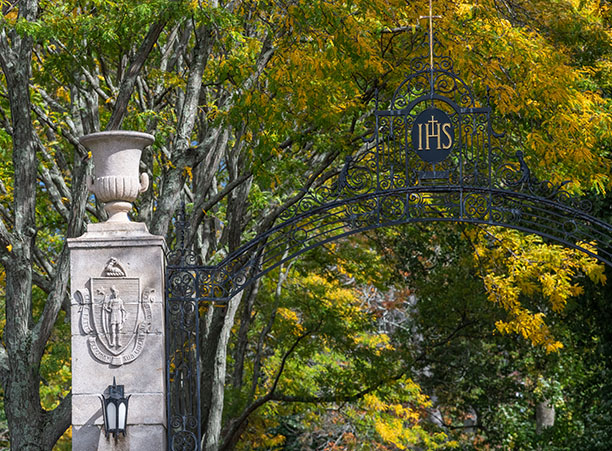
Every month, an email lands in the inboxes of the first-year students at Holy Cross, filled with study tips like:
1. "If possible, separate your work space from your relaxing space."
2. "Set aside time without electronics."
3. "I said it once and I will say it again: office hours save lives! … Going through material with professors, who subtly ask comprehension questions, is eye-opening. Through office hours, I can identify what I need to go over again."
It's called the Montserrat Tip Column, a resource of recommendations from sophomores serving in the Montserrat Student Ambassador Group. The ambassadors—or MSAGs as they are called among the faculty—support Montserrat, the yearlong program that introduces all first-year Holy Cross students to the liberal arts. And the monthly advice email is just one of several ways that the ambassador program helps set up first-year Holy Cross students for success.
"Ambassadors are extremely helpful in both designing and implementing programming in Montserrat," says Alison Ludden, director of Montserrat and a professor of psychology at the College. "They provide candid feedback from a student's perspective on why events and experiences are particularly successful and where we have room for improvement. This year, their mentoring role has been particularly important for first-year students who have not had the residential experience. As sophomores, their Montserrat experiences are still fresh on their minds: they talk about the foundational role of the Montserrat seminar in the Holy Cross curriculum but also the key role that the program plays in helping students make friends and create a supportive social network their first year."
Caroline Kuhlman ’23, a French major and education minor from Winchester, MA, volunteers as an ambassador because of how much she enjoyed her own Montserrat experience.
"I felt like I was really able to become a part of the Holy Cross community through my Montserrat experience, and also a part of the Worcester community, because we have community-based learning for that class as well," Kuhlman says. "I wanted to be an ambassador because it felt like a way to continue to be an active member of the Holy Cross community, to continue to foster my relationships with the professors and to give the first-year students a sense of comfort, that they have another student who can help guide them."
Kuhlman and fellow ambassador Lindsay Riley '23 host a weekly ambassador office hours session on Zoom, where students have come to them for tips on how to approach their assignments. In addition to supporting the first-year students by making themselves available for questions or concerns, the ambassadors are also a resource for the faculty teaching Montserrat courses. They attend faculty planning meetings for both classes and events.
"We have the students advise us, to give a student perspective," says Timothy Joseph, associate professor of classics, who counts on Kuhlman and Riley as the ambassadors for his class. "We've done even more of turning to the students for wisdom [this year] with remote learning."
Joseph's ambassadors have encouraged smaller discussion groups and adding interactive elements like trivia to classes and events, to keep students engaged during Zoom meetings. Bridget Franco, an associate professor of Spanish who teaches Latin American film, said that, last year, her ambassadors offered helpful feedback on the scheduling for an evening event at the Worcester Art Museum.
"It is a really nice back-and-forth we have with the ambassadors," Franco says. "They felt comfortable sharing their perspective and we learned a lot as faculty about the first-year experience, having these second-year student voices in the room with us. All the ambassadors understand the value of Montserrat and want to share that perspective."
The Montserrat program creates a community of support for first-year students, and is further strengthened by the work of the student ambassadors, especially with students away from campus this semester. Ambassador Stephany Zabala '23, a sociology and health studies major from Providence, RI, noted that, since Montserrat classmates are together all year, they will become the most consistent community for the first-year students while they are away from campus. Zabala worked with Professor Franco to plan a storytelling circle event on Zoom, where students shared personal stories in small groups, in response to in-the-moment prompts.
"This event pushed students to actively listen and feel comfortable enough to be vulnerable and share their experiences," Zabala said. "I was in a group of strangers, but I have never felt more comfortable sharing a story in my entire life."
As the academic year continues, the Montserrat students and ambassadors will go from strangers to supporters, and the first-year students will build a foundation for success during the rest of their years at Holy Cross.
"Having a program like Montserrat is really helpful, because you're with the same people the entire year, the same professor. It becomes a support system," Kuhlman said. "I’m more of a soft-spoken person and I had trouble feeling comfortable participating in my classes at the beginning of my first year. But through Montserrat, I really started to understand how to be an active participant in class. It was a great way to meet people, through events and classes, and a good foundation for making friends."
To learn more about the Montserrat program, visit https://www.holycross.edu/holy-cross-approach/montserrat.
Montserrat Student Ambassadors Facilitate Community for First-Years During Remote Semester
Both faculty and first-year students lean on the student ambassadors to improve programming and navigate college culture
Read Time
4 Minutes

